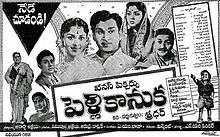Pelli Kanuka (1960 film)
| Pelli Kanuka | |
|---|---|
 Theatrical release poster | |
| Directed by | C. V. Sridhar |
| Produced by |
S. Krishna Murthy T. Govindarajan Sridhar |
| Written by | Acharya Atreya (dialogues) |
| Screenplay by | C. V. Sridhar |
| Story by | C. V. Sridhar |
| Based on | Kalyana Parisu (1959) |
| Starring |
Akkineni Nageswara Rao Krishna Kumari B. Saroja Devi |
| Music by | A. M. Rajah |
| Cinematography | A. Vincent |
| Edited by | N. M. Shankar |
Production company |
Venus Pictures |
| Distributed by | Navayuga Films |
Release date |
|
Running time | 185 mins |
| Country | India |
| Language | Telugu |
Pelli Kanuka (English: Wedding Gift) is a 1960 Telugu drama film, produced by and directed by C. V. Sridhar. It stars Akkineni Nageswara Rao, Krishna Kumari and B. Saroja Devi in the lead roles, with music composed by A. M. Rajah. The film is a remake of the Tamil film Kalyana Parisu (1959). Shades of the story line were also used in the Telugu movie Devata (1982), which was also remade as the Hindi film Tohfa (1984).
Plot
Bhaskar (Akkineni Nageswara Rao) and Vasanti (B. Saroja Devi) are college mates who clash when she complains to the college principal about a love letter he sent her. Later on realizing her mistake, Vasanti apologizes to him and the two fall in love. Vasanti's elder sister, Geeta (Krishna Kumari), supports the family by stitching clothes. Bhaskar rents the room upstairs in their house. He falls ill and in nursing him, Geeta falls in love with him. She confides her love to Vasanti, who decides to sacrifice her love for the sake of her sister and convinces Bhaskar to marry Geeta. Bhaskar initially neglects Geeta. On finding out, Vasanti writes to him that their sacrifice, made for Geeta's happiness, would mean nothing unless he is a good husband to Geeta. Bhaskar relents and Geeta and he have a son. Vasanti joins them and Geeta suspects that there is something going on between Bhaskar and Vasanti and makes Vasanti leave the house. A few years later Geeta, having found out that Bhaskar and Vasanti loved each other, dies in guilt, leaving Bhaskar alone to bring up their child making him promise that he will make Vasanti the child's mother. Bhaskar learns of Vasanti's impending marriage to her former boss Raghu (Jaggayya). By the time he reaches there, Vasanti is already married. He hands over his child to Vasanti as a wedding gift and walks away.
Cast
- Akkineni Nageswara Rao as Bhaskar
- Krishna Kumari as Geeta
- B. Saroja Devi as Vasanti
- Jaggayya as Raghu
- Gummadi
- Relangi as Satyam
- Girija as Kantam
- K. Malathi as Geeta's mother
- Master Babu as Geeta's son
Crew
- Art: Ganga
- Choreography: Heeralal, K. S. Gopala Krishnan
- Dialogues: Acharya Atreya
- Lyrics: Samudrala Sr, Acharya Athreya, Arudra, Karthik
- Playback: A. M. Rajah, P. Susheela, S. Janaki, Jikki
- Music: A. M. Rajah
- Editing: N. M. Shankar
- Cinematography: A. Vincent
- Producer: S. Krishna Murthy, T. Govindarajan, Sridhar
- Story - Screenplay - Director: C. V. Sridhar
- Banner: Venus Pictures
- Release Date: 22 April 1960
Soundtrack
| Pelli Kanuka | |
|---|---|
| Film score by A. M. Rajah | |
| Released | 1960 |
| Genre | Soundtrack |
| Length | 28:06 |
| Label | SAREGAMA Audio |
| Producer | A. M. Rajah |
Music composed by A. M. Rajah. Music released on SAREGAMA Audio Company.
| S. No | Song Title | Lyrics | Singers | length |
|---|---|---|---|---|
| 1 | "Aade Paade Pasivada" | Samudrala Sr | P. Susheela | 3:20 |
| 2 | "Kannulato Palakarinchu" | Acharya Atreya | A. M. Rajah,P. Susheela | 3:38 |
| 3 | "Pulakinchani Madi" | Arudra | Jikki | 4:22 |
| 4 | "Akkayyaku Seemantham" | Arudra | P. Susheela, S. Janaki | 4:51 |
| 5 | "Aade Paade Pasivada" (Pathos) | Samudrala Sr | A. M. Rajah | 4:01 |
| 6 | "Teerenuga Netitone" | Samudrala Sr | A. M. Rajah, P. Susheela | 3:26 |
| 7 | "Vaaduka Marchedavela" | Karthik | A. M. Rajah, P. Susheela | 4:28 |
Production
The film was a remake of Kalyana Parisu (1959) from Tamil. A triangular love story, the film is about a young man who rents a house near his girlfriend, but the girl's elder sister is not aware of their romance. She subsequently falls for the man and wishes to marry him, so her younger sister decides to sacrifice her love, unknown to the former.[1] Akkineni acted in the Tamil version also, but did not portray the hero role, he did another role, portrayed by Jaggaiah in Telugu. A. M. Raja provided music for both the versions. Krishna Kumari played the role of Vijayakumari and Relangi played the role of Thangavelu.[2] Saroja Devi reprises her role from the Tamil original.[3] The comedy track between Relangi and Girija became popular and was remade with Brahmanandam and Kovai Sarala.
References
- ↑ "Pellikanuka (1960)". The Hindu. 23 March 2016. Retrieved 30 December 2016.
- ↑ "Pelli Kanuka 1960". Telugu Cinema. Archived from the original on 23 December 2005. Retrieved 11 November 2015.
- ↑ "Saroja Devi in Kalyana Parisu and Pelli Kanuka". The Times of India. Retrieved 5 November 2016.
External links
- Pelli Kanuka on IMDb